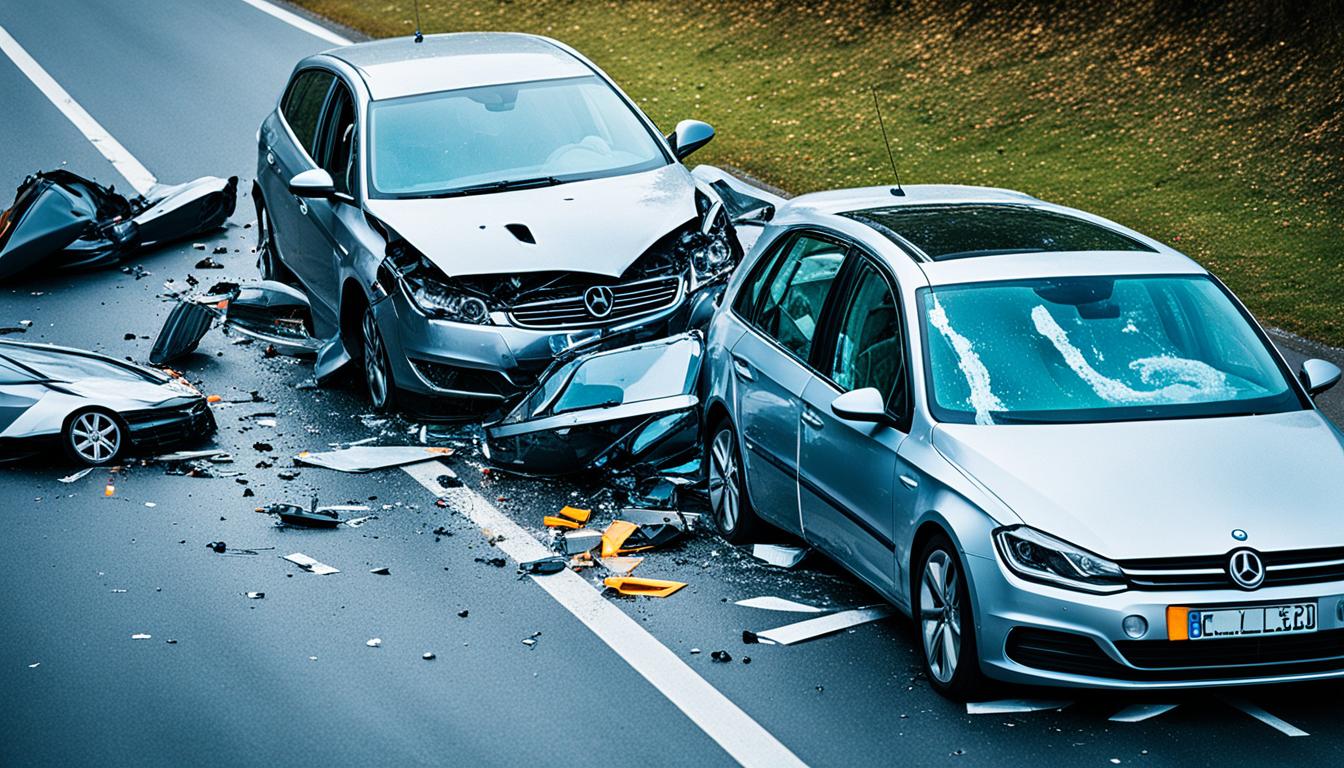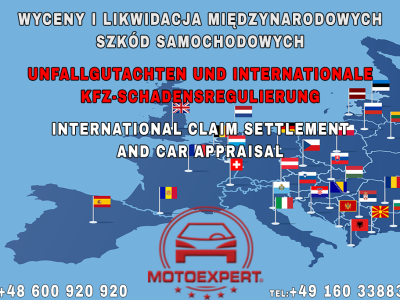Driving in Germany requires a thorough understanding of the local traffic laws and regulations, especially when it comes to reporting a collision. According to the first source, reporting a collision in Germany is a crucial step, as driving off without notifying the authorities can be considered a criminal offense punishable by up to three years in prison or a monetary fine, depending on the circumstances. Even if the damage appears minor, it is essential to report the incident to the German police or the U.S. military police, as they will provide guidance on the necessary procedures to follow.
To further support our understanding of the legal landscape, the second source delves into the various traffic violations and their corresponding fines, penalty points, and license suspension penalties in Germany. Additionally, the third source sheds light on the different types of motor vehicle insurance available in Germany, the legal requirements, and the steps to take when dealing with insurance companies in the event of an accident.
Key Takeaways
- Reporting a collision in Germany is a legal requirement, even for minor incidents.
- Failing to report a collision can result in severe legal consequences, including up to three years in prison or a monetary fine.
- The German police or U.S. military police can provide guidance on the necessary steps to take after a collision.
- Understanding the different types of motor vehicle insurance and the claims process is crucial when dealing with an accident.
- Compliance with traffic laws and regulations is essential to avoid additional legal issues in the event of a collision.
Introduction
Navigating the complexities of reporting a collision in Germany is crucial for maintaining road safety and ensuring compliance with local regulations. As responsible drivers, we must understand the importance of reporting such incidents, as well as the potential legal consequences of failing to do so. This section will explore the significance of reporting a collision and the legal implications associated with neglecting this important duty.
The Importance of Reporting a Collision
According to the first source, reporting a collision in Germany is not just a recommended practice; it is a legal requirement. Driving off without notifying the authorities can be considered a criminal offense, potentially resulting in severe penalties, such as up to three years in prison or a monetary fine, depending on the circumstances. Even minor collisions should be reported to the German police or the U.S. military police, as they can provide guidance on the necessary steps to take.
Legal Consequences of Failing to Report
Failing to report a collision in Germany can have serious legal ramifications. As the first source indicates, neglecting to notify the authorities, even if the damage appears insignificant, can lead to severe consequences. Drivers who do not fulfill their legal obligation to report an accident may face criminal charges and face substantial fines or even imprisonment. Understanding the potential penalties is crucial for maintaining road safety and avoiding the pitfalls of non-compliance.
What to Do Immediately After a Collision
When involved in a collision in Germany, the immediate actions taken can have a significant impact on the subsequent proceedings. According to the first source, the first crucial steps are to secure the accident site and collect evidence. This includes moving the vehicles to a safe location, if possible, and taking detailed photographs of the damage. Gathering witness information and contacting the German police or U.S. military police is essential, even if the damage appears minor.
Securing the Accident Site
In the event of a collision, our primary concern should be the safety of all involved. We must act quickly to secure the accident site, ensuring that the vehicles are positioned in a way that minimizes the risk of further incidents. This may involve moving the cars to a nearby parking lot or side street, if the situation allows. Activating hazard lights and setting up warning triangles can also help alert other drivers to the presence of the accident.
Collecting Evidence and Documentation
Documenting the incident thoroughly is crucial for the insurance claim and any potential legal proceedings. We should take clear, high-quality photographs of the damage to both vehicles, capturing the overall scene as well as specific details. Gathering witness information, including their names and contact details, can also provide valuable support to our case. It is essential to maintain a record of the events, as this documentation will greatly facilitate the handling of the collision aftermath.
By taking these immediate steps, we can ensure that the necessary evidence is collected and the accident site is properly secured. This proactive approach will not only assist with the insurance claims process but also help us fulfill our obligations as drivers in Germany, in accordance with the country’s traffic regulations.
Notifying the Authorities
When it comes to reporting a collision in Germany, it is crucial to notify the authorities, regardless of the extent of the damage. The first source explains that even in the case of minor incidents, drivers must contact the German police or the U.S. military police to ensure they fulfill their legal obligations and protect their rights.
Calling the German Police
After securing the accident site and gathering the necessary evidence, the next step is to call the German police non-emergency number. The police can provide guidance on the appropriate procedures to follow and may even send a vehicle to inspect the damage at the scene. This is a crucial step in the reporting process, as it ensures the authorities are aware of the incident and can assist in the subsequent insurance claim and legal proceedings, if needed.
Contacting the U.S. Military Police
If the driver does not speak German or the police operator does not have sufficient English proficiency, they can call the U.S. military police station. The U.S. military police can then establish a direct connection to the German Polizei, facilitating the communication and ensuring the incident is properly reported. This option can be particularly helpful for U.S. service members or their dependents who may be more comfortable interacting with the U.S. military police in such situations.
Reporting the collision to the authorities, whether the German police or the U.S. military police, is a legal requirement in Germany. This step not only ensures compliance with local regulations but also provides vital documentation and support for any subsequent insurance claims or legal proceedings that may arise from the incident.
Jak zglosic kolizję w Niemczech ?
Gdy dojdzie do wypadku drogowego w Niemczech, zgłoszenie kolizji jest kluczowym krokiem, jaki musi podjąć kierowca. Zgodnie z pierwszym źródłem, proces ten składa się z kilku kluczowych etapów.
Pierwszym zadaniem kierowcy jest zabezpieczenie miejsca zdarzenia i zebranie dowodów, na przykład poprzez wykonanie zdjęć uszkodzeń. Następnie powinien on zadzwonić na niemiecki numer alarmowy policji lub do amerykańskiej policji wojskowej, aby zgłosić incydent, nawet jeśli szkody wydają się niewielkie. Policja udzieli wówczas wskazówek co do dalszych niezbędnych procedur.
Kierowcy muszą również zebrać informacje od świadków oraz mieć przy sobie wymagane dokumenty, takie jak prawo jazdy, dowód rejestracyjny pojazdu i informacje o ubezpieczeniu. Dzięki temu cały proces zgłoszenia wypadku będzie przebiegał sprawnie i zgodnie z niemieckimi przepisami drogowymi.
Dealing with Witnesses
After a collision, gathering witness information can be crucial in providing evidence and supporting the driver’s account of the incident. The German traffic regulations emphasize the importance of actively seeking out and documenting any witnesses to the accident. By obtaining the names and contact details of individuals who observed the collision, drivers can bolster their case when dealing with insurance companies and potentially in any legal proceedings that may arise.
Gathering Witness Information
When a collision occurs, it is essential for drivers to take immediate action to identify and record any available witness information. This may involve actively scanning the area and politely approaching potential witnesses to request their contact details. Obtaining the names, phone numbers, and email addresses of those who witnessed the incident can provide valuable evidence to support the driver’s version of events.
By diligently gathering witness information, drivers can enhance their chances of successfully navigating the post-accident procedures and ensuring their rights and responsibilities are properly upheld. This information can prove invaluable when claiming compensation or resolving any disputes that may arise in the aftermath of the collision.
Required Documents
When involved in a collision in Germany, it’s crucial for drivers to have certain documents readily available. These essential documents not only facilitate the reporting process but also ensure compliance with German regulations.
Driver’s License
Drivers must have their valid driver’s license on hand when reporting a collision. This document serves as proof of the driver’s legal authorization to operate a motor vehicle in Germany. Presenting the driver’s license to the authorities can help expedite the reporting process and establish the driver’s identity.
Vehicle Registration
In addition to the driver’s license, the vehicle’s registration documents must also be provided. This information helps the authorities verify the ownership and details of the vehicle involved in the collision. Keeping the vehicle registration readily accessible can ensure a smooth and efficient reporting process.
Insurance Information
Drivers in Germany are required to have motor vehicle third-party liability insurance, which is mandatory. Providing the insurance information, such as the policy number and the insurance company’s contact details, can facilitate the claims process and the interaction with the insurance providers. This documentation is essential for the proper handling of the incident and any potential compensation claims.
Speeding and Traffic Violations
As drivers navigate the German roads, it’s crucial to understand the country’s traffic regulations and the potential consequences of violating them. According to the second source, Germany has a comprehensive set of rules and penalties when it comes to driving infractions, ranging from speeding and tailgating to more serious offenses such as hit-and-run and driving under the influence.
Fines and Penalties
Speeding is one of the most common traffic violations in Germany, and the penalties can be severe. Drivers caught exceeding the speed limit can face hefty fines, ranging from €20 for minor infractions to €700 or more for extreme cases. In addition to monetary penalties, speeding violations also result in the accumulation of penalty points on the driver’s license. Depending on the severity of the offense, drivers may also face license suspension or even criminal charges.
Other common traffic violations in Germany include tailgating, improper lane changes, and running red lights or stop signs. These infractions can also result in substantial fines, penalty points, and potential license suspension. It’s crucial for drivers to remain vigilant and comply with traffic laws to ensure their own safety and that of others on the road.
License Suspension
More serious traffic violations, such as hit-and-run incidents or driving under the influence of alcohol or drugs, can lead to even more severe consequences. Depending on the circumstances, these offenses may result in criminal charges and the suspension of the driver’s license for a significant period, potentially up to several years. Drivers should be aware of these consequences and make responsible choices behind the wheel to avoid jeopardizing their driving privileges and facing legal repercussions.
By understanding the German traffic regulations and the potential penalties for violations, drivers can ensure they comply with the law and maintain a safe driving environment for themselves and others. Staying informed and exercising caution on the roads is essential for avoiding collisions and the associated legal and financial implications.
Motor Vehicle Insurance in Germany
When it comes to driving in Germany, having the right motor vehicle insurance coverage is essential. According to the third source, third-party liability insurance is a legal requirement for all drivers in Germany. This type of insurance ensures that any victims of a traffic accident, including pedestrians or other motorists, are properly indemnified for their losses.
Third-Party Liability Insurance
The mandatory third-party liability insurance in Germany provides coverage for damages and injuries caused to other parties involved in an accident. It protects the policyholder from being held personally responsible for the financial consequences of a collision, making it a crucial safeguard for all drivers on German roads.
Comprehensive Coverage
While third-party liability insurance is compulsory, partially and fully comprehensive coverage are not. Partially comprehensive insurance protects the policyholder’s vehicle against losses from events such as fire, theft, or natural disasters. Fully comprehensive coverage, on the other hand, also includes protection for damage caused by the policyholder’s own fault.
Roadside Assistance
In addition to the basic motor vehicle insurance requirements, drivers in Germany may also consider purchasing roadside assistance contracts or motor vehicle accident insurance. These additional policies can provide valuable coverage in the event of a breakdown or personal injury, ensuring drivers have access to the support and resources they need when faced with unexpected situations on the road.
Understanding the different types of motor vehicle insurance available and their respective scopes of coverage is crucial for drivers in Germany. By ensuring they have the appropriate insurance in place, they can protect themselves and others in the event of a collision, while also complying with the country’s legal requirements.
Dealing with Insurance Companies
When dealing with the aftermath of a collision in Germany, it’s essential to understand the process of working with insurance companies. Drivers must navigate the complexities of reporting the accident and claiming compensation to ensure they receive the coverage they’re entitled to.
Reporting to Your Insurer
According to the third source, drivers in Germany are typically required to report the accident to their own motor vehicle insurer within one week of the incident. This prompt notification is crucial, as it allows the insurer to initiate the claims process and begin investigating the circumstances surrounding the collision. During this time, drivers should refrain from acknowledging any claims from the aggrieved party without first consulting their insurer, as this could jeopardize their coverage.
Claiming Compensation
As the aggrieved party, individuals involved in a collision in Germany can request financial compensation directly from the responsible party’s motor vehicle third-party liability insurer. This process involves submitting a written notice of claim within two weeks of the accident and providing the necessary documentation, such as inspection reports and cost estimates. Understanding the proper procedures for claiming compensation is crucial for navigating the insurance claims process effectively and ensuring a favorable outcome.
Legal Considerations
When it comes to motor vehicle accidents in Germany, drivers must be aware of several important legal considerations. These factors can have a significant impact on the insurance coverage and financial responsibility associated with a collision.
Intentional Damage
If a driver intentionally uses their vehicle to cause harm or damage, they will not be covered by their car insurance policy. In such cases, the driver will be held personally responsible for the resulting damages and any legal consequences.
Breach of Obligations
Drivers who fail to fulfill their obligations, such as leaving their car unlocked with the keys in the ignition, may be liable for a portion of the insurance benefits, up to a maximum of €5,000. Adhering to these obligations is crucial to avoid potential financial and legal liabilities.
Fault and Liability
The determination of fault and liability in a collision will dictate whether the driver’s motor vehicle third-party liability insurance will provide coverage or if they will be required to bear the costs themselves. Understanding the implications of fault and liability is essential for drivers to navigate the legal landscape effectively.
By familiarizing themselves with these legal considerations, drivers in Germany can ensure they comply with their obligations, avoid potential pitfalls, and safeguard their financial and legal standing in the event of a motor vehicle accident.
Conclusion
In conclusion, this comprehensive guide has provided detailed information on the steps to take when reporting a collision in Germany. Drivers must understand the importance of reporting the incident, the legal consequences of failing to do so, and the necessary procedures to follow, including securing the accident site, collecting evidence, and notifying the authorities. The guide also covered the various traffic violations and their corresponding penalties, as well as the different types of motor vehicle insurance available in Germany and the considerations when dealing with insurance companies.
By being informed about the legal requirements and best practices, drivers in Germany can ensure they handle a collision effectively and avoid potential legal and financial issues. Staying vigilant, documenting the incident thoroughly, and communicating with the appropriate authorities and insurance providers are crucial for navigating the procedures after a collision in Germany. With this knowledge, drivers can prioritize road safety and protect themselves from the financial and legal ramifications of a traffic accident.
Remember, Jak zglosic kolizję w Niemczech (How to report a collision in Germany), ubezpieczenie komunikacyjne (motor vehicle insurance), zderzenie samochodowe (car collision), niemieckie przepisy drogowe (German traffic laws), zgłaszanie wypadków (reporting accidents), procedury powypadkowe (post-accident procedures), obowiązki kierowcy (driver’s obligations), bezpieczeństwo na drodze (road safety), odszkodowanie (compensation), and postępowanie likwidacyjne (claims settlement) are all crucial considerations when navigating the complexities of a collision in Germany.






